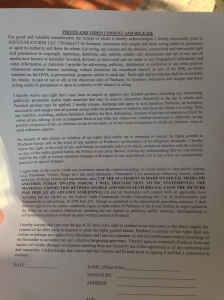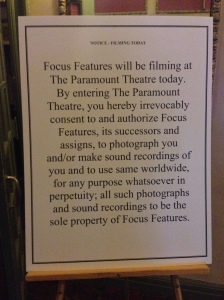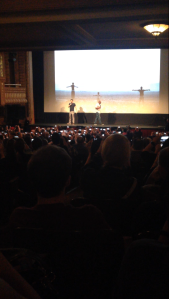
It’s a movie.
I’m a social media law geek. I have long accepted this fact and it shouldn’t be a revelation to you since you’re, you know, reading a blog about social media law. So nobody should be surprised that when I attended a movie premiere for Wish I Was Here last week and everyone took out their smartphones to take pictures of Zach Braff and Donald Faison I, instead, took pictures of the disclosure form and privacy warning. Because I’m geek like that.
I was a backer of Mr Braff’s Kickstarter campaign and paid to get two tickets to the Austin premiere and Q&A session. I am not a superfan of Mr. Braff–I thought Garden State was okay and I only watched a season or two of Scrubs–but I do think he’s a talented actor and saw him perform in Twelfth Night at Shakespeare in the Park. I was also intrigued by the Kickstarter project, being the first high publicity original movie to be funded after Veronica Mars. I sent my money, read the updates, and watched the backlash roll in with curiousity.
There were four items of interest that struck me regarding social media law at the movie premiere. I’m going to tell you three of them. Just kidding, here’s all four.
 1. The release form
1. The release form
I’ve enclosed a picture of the consent and release form that all attendees were required to sign prior to entering the theater. Much of it is standard for a movie screening where filming will take place if they may use the footage for behind the scenes featurettes. But the item that jumped out to me is the item IN BOLD ALL CAPS. Because, you know, that’s what bold all caps is supposed to do.
That text reads
I agree that to the extent I make any statements about the content including via social media or other public forums (e.g. Facebook, Twitter, Blogs, etc.) that such statements (“Statements”)…IF THE STATEMENT IS MADE ON SOCIAL MEDIA OR ANOTHER PUBLIC ON-LINE FORUM, I WILL DISCLOSE NEXT TO MY STATEMENT(S) THE MATERIAL CONNECTION BETWEEN MYSELF AND FOCUS FEATURES (I.E. I SAW THE PICTURE FOR FREE AT AN ADVANCE SCREENING…
This statement is for participants to comply with the FTC Endorsement Guidelines. They’re even explicitly called out in the next sentence of the release but they aren’t IN BOLD ALL CAPS so you might have missed it.
That’s a great call-out for such a long release form. It may be the only sentence you actually read if you’re handed this page and given a minute to sign before getting out of the hot Texas sun into the air conditioned theater. Although I may quibble with some technicalities (I paid for the tickets via Kickstarter so it wasn’t free, and I paid Zach Braff’s group not Focus) I’m a professional quibbler so I’m willing to focus on the positive. A good call-out for a venture they know will get mentioned on social media.
This sign was posted inside the theater before you could get to the orchestra seating and visible from the stairs leading to the balcony. While I understand the need for something like this, heck I’ve drafted a few in my career, I also think this sign goes a bit overboard. First, the release was already in the signed form that everyone had to fill out before they got inside so this is duplicative at best–but as a lawyer I can appreciate having multiple points where consent was gained just in case a lawsuit comes up (especially after DVDs have been produced).
I take less issue with the repetition than I do with the scope–while the signed form seems more targeted in the consent, this poster goes a bit overboard. Sure, it’s easier to print a sign with less language like YOU GIVE ME ALL THE RIGHTS! RAWR! it also goes beyond the scope of the event. According to this sign, Focus Features can now use my photograph to publicize an entirely different movie or event and that doesn’t help anyone.
I don’t think Focus would use my photo to publicize a different movie, mostly because I thoroughly enjoyed Reign of Fire and therefore have horrible taste in movies, but also because this is more likely just a defensive consent. If someone were to sue for being on the DVD then the company has a signed release form and this poster to use in their defense.
Still, even though I may be the only person who read this sign (and definitely the only one to take a picture of it), I have to wonder what would happen if someone took issue with the consent. I paid for the tickets to the premiere–that’s what the Kickstarter event promised me. There is some general language in the Kickstarter campaign that if a reward conflicts with laws they’ll work to give you a substitute, but it isn’t a conflict of law for me to attend without giving consent to filming. Just a small thought–perhaps they had a special area reserved for non-consenting audience members or they figured the odds were so low of this being an issue it wasn’t worth developing a plan. I just find that kind of thing interesting.
3. The backlash
During the Q&A session after the film, one man asked Mr. Braff if he experienced any backlash over the funding. The response was along the lines of “Where have you been? Did you contribute and then go off-line for a year? Did you just land from the space station and thought, ‘Hey, I can still make the premiere!'” It was funny and the audience’s reaction showed they were all aware of the backlash as well.
The answer was interesting as well. Mr. Braff explained how his world is all about getting films financed and when something is your world you unrealistically expect that other people will know something about that world. So when the backlash started rolling in about the Kickstarter project he suddenly realized that people didn’t really understand how films are financed and why Kickstarter could help him. So that was a lesson learned, but ultimately something he wasn’t concerned about since his fans and other interested parties did back him and that mattered more.
Mr. Braff did express some concern over the backlash regarding Kickstarter itself–specifically that people attacked him for taking money away from other Kickstarter projects that could use the money more. He said that Kickstarter was quiet at first but later spoke up saying that high publicity projects like this do draw attention to the platform and ultimately bring in new users who end up funding more projects–the net being more money shared with more projects. I can’t find a link to Kickstarter’s statement but that makes sense and is also probably a lesson learned for future high publicity projects.
4. Reflecting on the social world
At the end of the Q&A session, Mr. Braff and Mr. Faison sang “Guy Love” as a special treat to the audience. They said it had been a while since they performed it and don’t get a lot of opportunities to sing it together so everyone should record it. And so they did. This was my view of the song:
Working in social media I often take for granted the world of information and connections we have at our fingertips. But every once in a while it strikes home. When I looked at the event before my eyes I wasn’t watching the stage, I was looking at all those phones. Yes, in my head I realized everyone probably has one, but it takes events like these for that to sink in sometime. Seeing everyone recording the event, having their own perspective and building their own memories and being able to share it with all of their friends as well.
That’s awesome. That’s social media.


